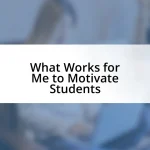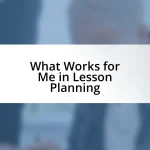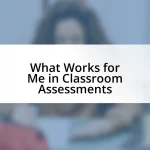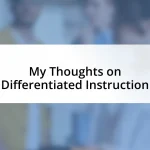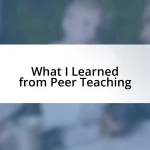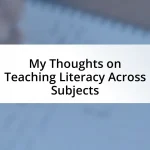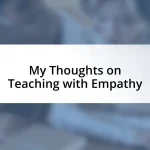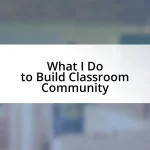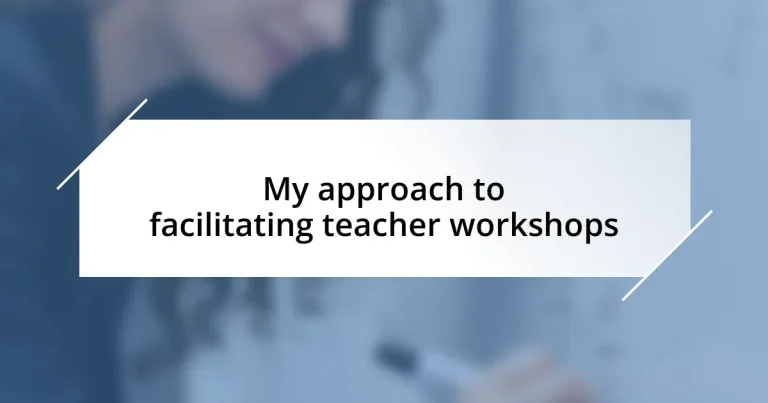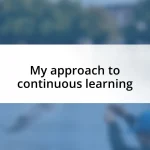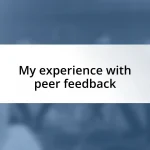Key takeaways:
- Setting clear workshop goals fosters engagement and encourages educators to connect on a deeper level, transforming the learning experience.
- Identifying participant needs through surveys and open discussions helps tailor content, ensuring relevance and enhancing the learning environment.
- Incorporating interactive and varied activities, such as role-plays and small group collaborations, caters to different learning styles and promotes dynamic participation.
- Providing ongoing support and resources through follow-ups and professional learning networks reinforces newly acquired skills and fosters a collaborative community among educators.
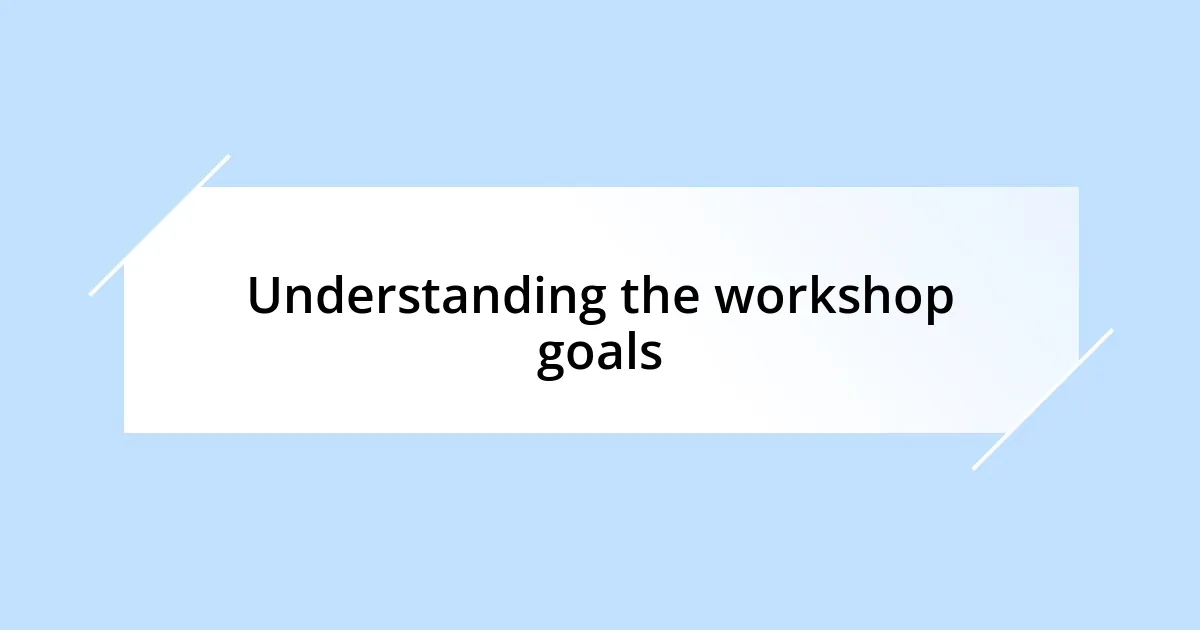
Understanding the workshop goals
Understanding the goals of a workshop is paramount to its success. I remember leading a session where our primary aim was to deepen instructional strategies. At first, I thought just diving into content would suffice, but it was the open discussion about what we truly wanted to achieve that sparked real interest and engagement among the teachers.
When I strategically outline the workshop goals, I think about the emotional responses I want to evoke. For instance, how can I encourage educators to feel inspired and motivated to try new techniques in their classrooms? I’ve found that sharing my own experiences of failure and triumph can break down walls, making it easier for participants to connect. It’s fascinating to see how shared vulnerability can shift a workshop environment from merely informative to genuinely transformative.
Have you ever left a workshop feeling a bit adrift, unsure of how the insights apply to your context? I’ve felt that, too. This is why setting clear, relatable goals at the beginning is crucial. It helps frame the entire experience, guiding educators towards actionable takeaways that resonate with their unique teaching styles and challenges.
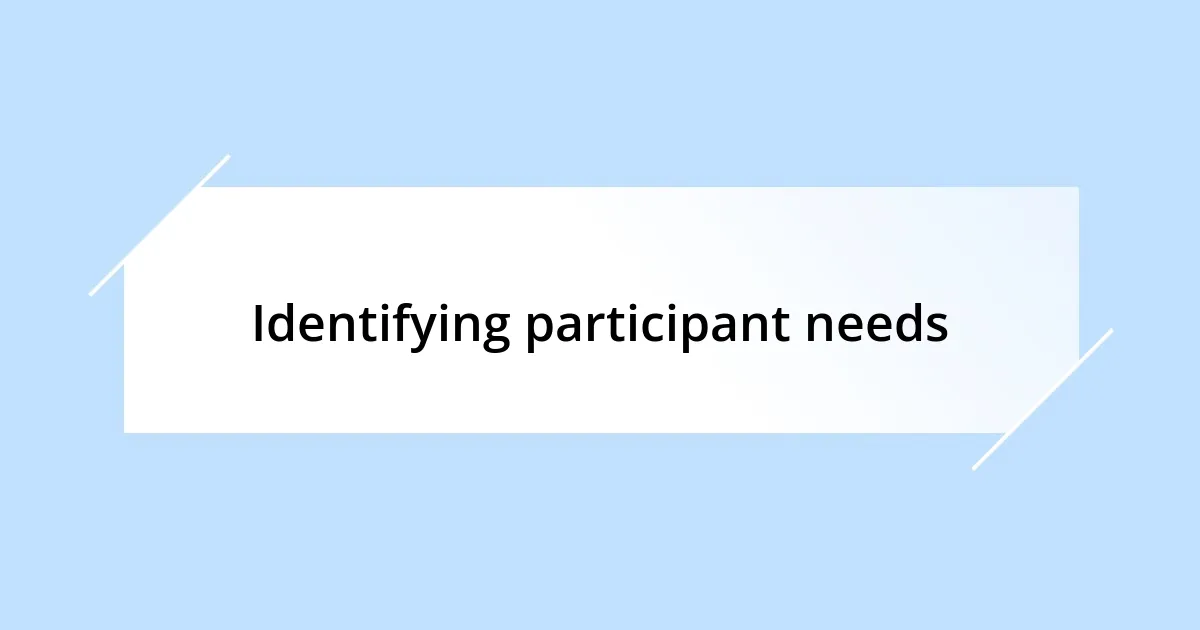
Identifying participant needs
When it comes to identifying participant needs, I’ve learned that asking the right questions goes a long way. In one workshop, I circulated a simple questionnaire before our session, asking teachers to share their biggest challenges. The responses were eye-opening. Rather than assuming I knew what they needed, I tailored the content based on their input. I clearly remember how one educator mentioned struggling with classroom management, which led me to integrate practical strategies into our discussion that resonated deeply with the group.
To further refine my understanding of participants’ needs, I focus on creating an environment where they feel safe to share their thoughts. Here’s how I approach it:
- Conduct pre-workshop surveys or interviews to gather insights on specific challenges.
- Encourage open dialogue during the session, allowing participants to voice their needs.
- Observe body language and engagement levels to gauge interest in certain topics.
- Foster small group discussions, where educators can discuss their experiences, revealing collective needs.
By centering the workshop on their expressed needs, I not only show that I value their input but also enhance their overall learning experience. I find that when participants see their challenges acknowledged, it leads to a more dynamic and engaging atmosphere.
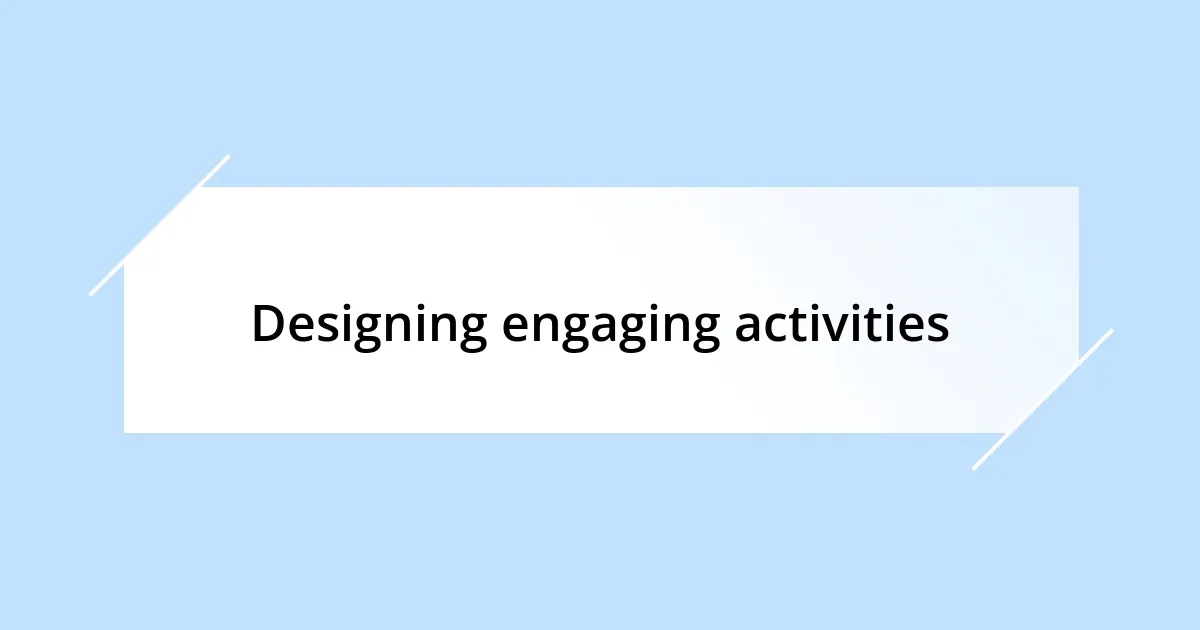
Designing engaging activities
Designing engaging activities is a crucial aspect of facilitating effective teacher workshops. I’ve discovered that incorporating interactive elements can transform a traditional lecture into a vibrant dialogue. For example, during one workshop on literacy strategies, I had educators break into small groups to develop lesson plans together. The energy in the room was palpable, and it was fascinating to see how collaboration kindled creativity. It’s those moments of shared brainstorming that often lead to the most innovative ideas.
Equally important is the use of hands-on activities that allow participants to practice what they learn. I once introduced a role-play scenario in a session on classroom management. Teachers would act out difficult situations, which not only made everyone laugh but also led to some eye-opening reflections on their practices. This not only lightened the mood but also fostered deeper discussions about real-world challenges they faced. It’s incredible how simulations can build confidence and encourage educators to try new approaches in their classrooms.
Lastly, I always strive to mix and vary the types of activities, appealing to different learning styles. Some teachers thrive in discussion-based settings, while others prefer hands-on tasks or visual aids. During a workshop centered on technology integration, I utilized a mix of polls, group discussions, and multimedia presentations. Providing varied engagement strategies helps ensure that every participant feels included and valued, which ultimately enhances their experience and commitment to applying what they learned.
| Activity Type | Description |
|---|---|
| Small Group Collaboration | Participants work together to develop lesson plans, fostering energy and creativity. |
| Role-Play Simulations | Teachers act out classroom scenarios, allowing them to reflect and discuss management challenges. |
| Varied Engagement Strategies | A mix of discussions, polls, and presentations to cater to different learning styles, ensuring inclusivity. |
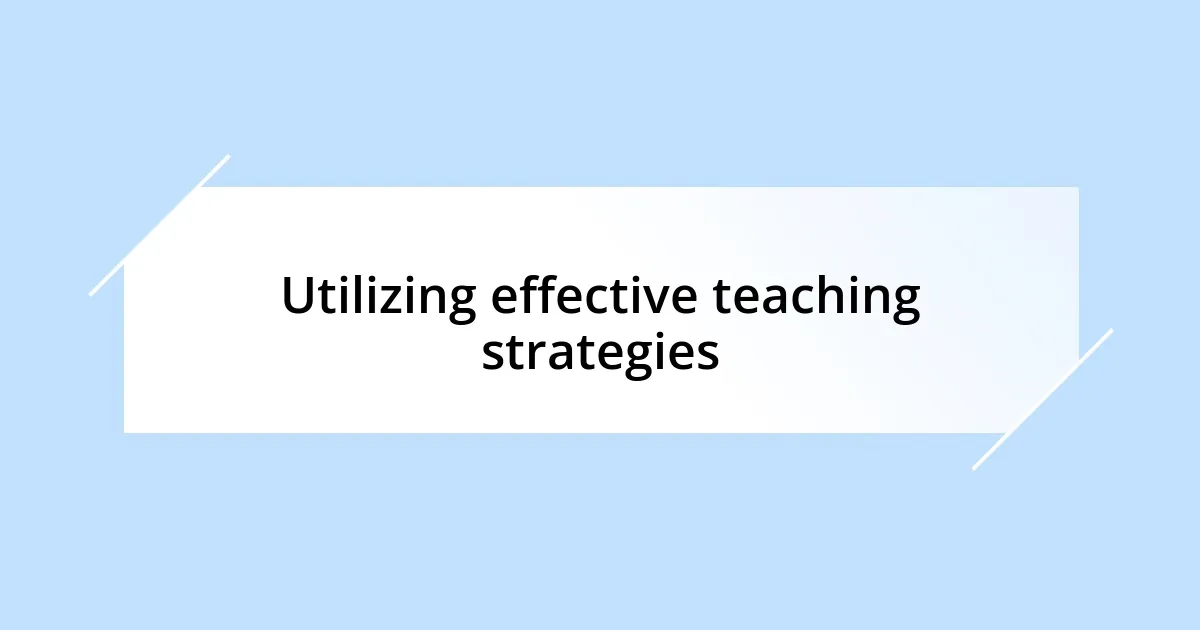
Utilizing effective teaching strategies
Effective teaching strategies can truly elevate the impact of any workshop. During one session, I experimented with using a jigsaw activity, where participants became ‘experts’ on different aspects of literacy. I watched as teachers transitioned from tentative voices to passionate advocates for their topics. Have you ever witnessed a group become so engaged that they forgot they were in a professional development setting? It’s moments like these that reaffirm the power of collaborative learning.
In my experience, utilizing formative assessment techniques can significantly enhance understanding. For instance, I once implemented quick ‘exit tickets’ at the end of a session, asking teachers to jot down their top takeaway. By reviewing their responses, I gained invaluable insights into their learning and areas needing further clarification. It’s genuinely rewarding to see how such simple tools can guide your next steps and refine the workshop experience for everyone involved.
Encouraging reflection is another strategy I find immensely beneficial. At a recent workshop, I led a guided visualization exercise, prompting participants to envision applying new strategies in their classrooms. The atmosphere shifted to one of quiet contemplation, and I could see the wheels turning. Isn’t it fascinating how taking a moment to reflect can lead to profound insights? I believe fostering this introspection helps teachers connect theory with practice, ultimately strengthening their confidence to implement what they’ve learned.
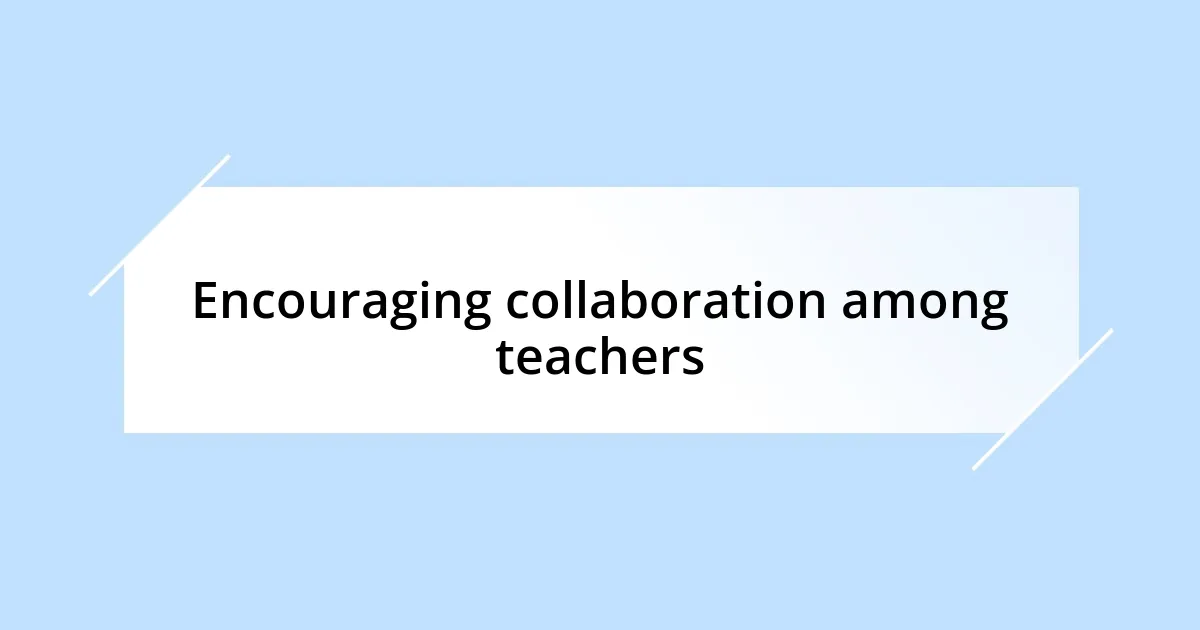
Encouraging collaboration among teachers
Collaborative environments are vital for fostering innovation among teachers. I recall a workshop where I organized a “Teach Meet” format, inviting educators to share their favorite techniques. As they presented, I could see the excitement spark in their eyes—it was as if they were sharing hidden treasures. Isn’t it inspiring to witness teachers so passionate about their craft? The camaraderie that developed during this session was tangible, highlighting how collaboration can reinvigorate our purpose in education.
In my experience, setting up a buddy system can enhance support among teachers. I once paired experienced educators with those new to the profession, creating a safe space for sharing ideas and resources. The conversations that emerged were rich and engaging, with mentors providing insights while mentees brought fresh perspectives. This reciprocal mentoring not only built relationships but also transformed the way they approached challenges in their classrooms.
I also find that establishing a culture of regular feedback encourages openness and growth. During one workshop, I encouraged participants to give feedback on each other’s lesson plans. The constructive discussions that ensued were enlightening, revealing different angles I never considered. Have you ever had a conversation that completely changed your approach to a problem? That’s the kind of exchange I aim to cultivate, where collaboration leads to meaningful improvements and mutual respect among educators.
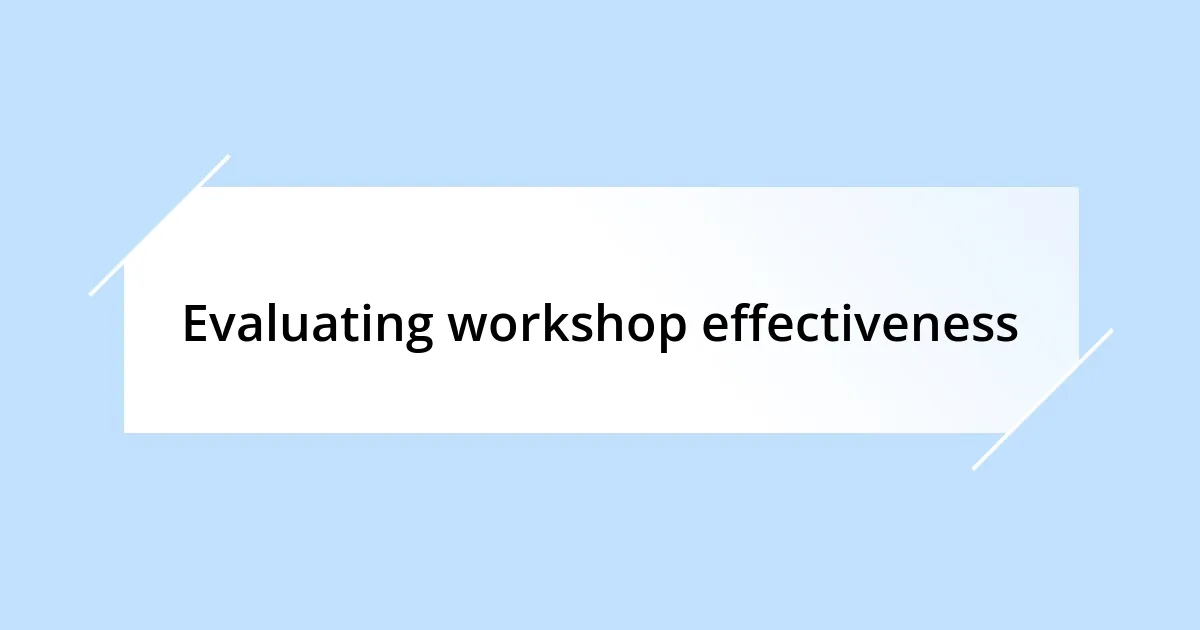
Evaluating workshop effectiveness
Evaluating the effectiveness of a workshop is crucial for understanding its impact on educators. I recall a workshop where I utilized a feedback survey, asking participants to rate various aspects, from content clarity to engagement levels. Seeing their responses gave me a genuine sense of what resonated and what fell flat. Have you ever relied on direct feedback to inform your future planning? I’ve found that these honest insights can be like a compass, guiding me toward improvement.
Another method I embrace is analyzing participants’ practical application of new skills. After a session on classroom management strategies, I followed up with a few attendees to discuss their experiences implementing these techniques. Their stories were enlightening: some faced unexpected hurdles while others shared triumphs. It’s like peeling back layers of understanding—what works in theory sometimes takes unexpected twists in practice.
I also prioritize group discussions post-workshop to facilitate reflective conversations. During one session, I created a safe space for sharing both successes and challenges encountered after implementation. The vulnerability in the room was palpable, and it struck me how shared learning fosters growth. Isn’t it refreshing to see educators support each other in real-time? These discussions not only evaluate the workshop’s effectiveness but also strengthen the community of practice, making it a continuous cycle of learning and improvement.
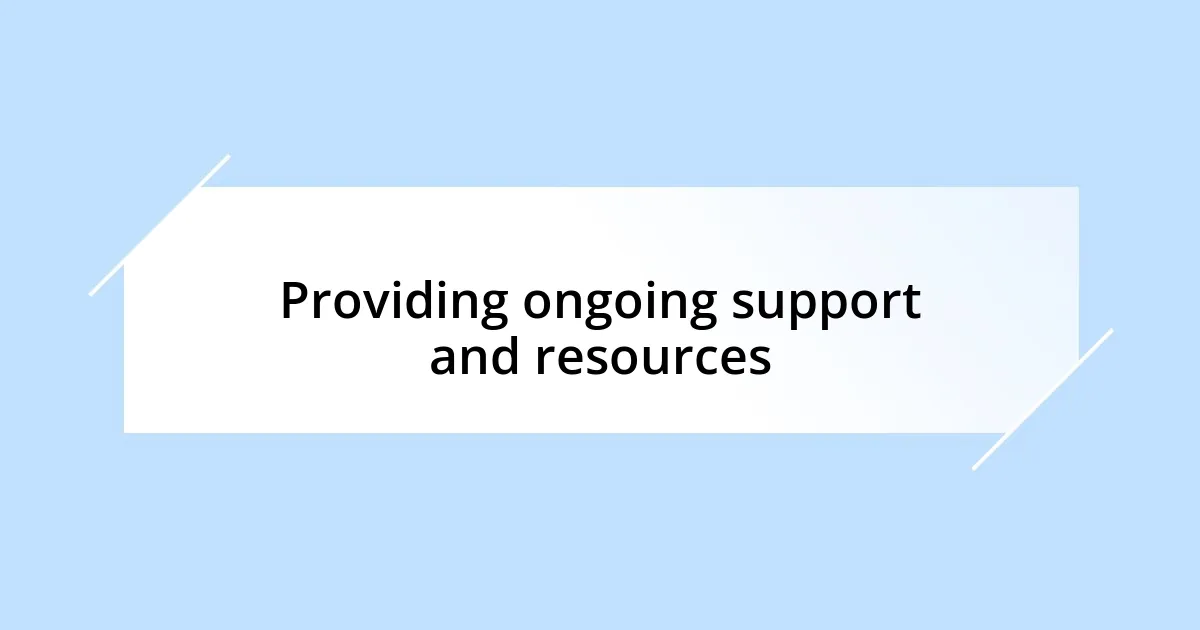
Providing ongoing support and resources
Providing ongoing support and resources is essential in reinforcing what teachers learn during workshops. I remember a particular instance where I developed a resource hub, collecting articles, videos, and practical tools aligned with our workshop topics. This hub became a lifeline for educators—many would return to it regularly, finding just the right resource when faced with a challenging situation in their classrooms. Doesn’t it feel reassuring to know you have a trusted source to turn to?
One thing I’ve also found effective is scheduling follow-up sessions, either in-person or virtual, to check in on how teachers are applying new strategies. For instance, during a recent follow-up, I discovered that some educators had adapted their lesson plans in creative ways I hadn’t anticipated. Their enthusiasm was contagious as they shared their experiences, proving that ongoing dialogue can inspire continuous growth. Have you ever witnessed such transformation? It’s incredibly fulfilling to see the practical magic unfold after a seemingly simple discussion.
Additionally, I support educators in creating their own professional learning networks. I once facilitated a small group where teachers from different schools met monthly to share experiences and resources. The bonds formed were heartwarming, and the stories exchanged were invaluable, ranging from classroom successes to navigating challenges. Isn’t it amazing how collaboration can turn a solitary journey into a shared adventure? This ongoing support not only builds a rich resource pool but also fosters a sense of community that extends well beyond a single workshop.

